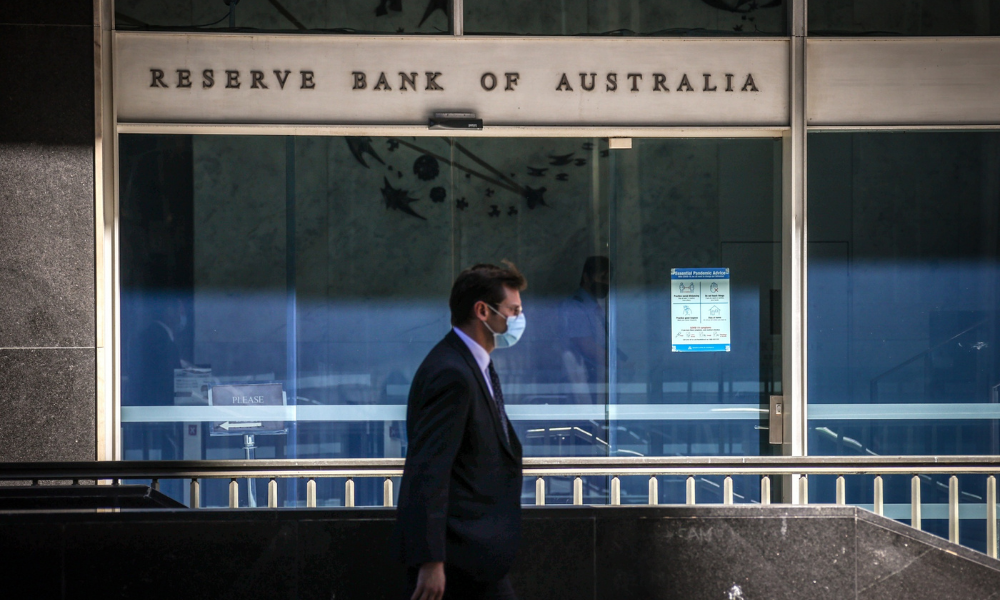
Australian home borrowers are expected to be hit with an even bigger interest rate rise in June as inflation soars at an even faster pace than anticipated.
The Reserve Bank of Australia on May 3 raised the cash rate for the first time since November 2010 and has on Tuesday released the minutes of that meeting hinting at more pain to come to rein in strong consumer spending.
'Members observed that it would be more difficult to return inflation to the target if the inflation psychology in Australia were to shift in an enduring way,' it said.
Borrowers with a typical $600,000 loan are now adjusting to a $78 a month increase in their monthly repayments and could find themselves paying another $78 on their mortgage following the RBA's June 7 meeting in three weeks.
On Friday the 13th last week, Westpac and ANZ matched the RBA's quarter of a percentage point increase that ended the era of the record-low 0.1 per cent cash rate.
NAB is on Tuesday passing on in full that 0.25 percentage point increases to its variable rate customers while the Commonwealth Bank, Australia's biggest home lender, will raise its rates on Friday in line with the RBA move.
Economists are expecting a bigger-than-expected wage price index number for the March quarter, due out on Wednesday, to spark another rate rise in June.
This could undermine Labor leader Anthony Anthony's call for the Fair Work Commission to raise the minimum wage from July 1 in line with the 5.1 per cent inflation rate - a level well above the RBA's 2 to 3 per cent target.
While wages last year grew by just 2.3 per cent, the RBA is expecting pay growth to surge above the long-term average of 3 per cent for the first time in almost a decade.
'While the inertia arising from multi-year enterprise agreements and current public sector wages policies would continue to weigh on aggregate wages growth in the near term, a period of faster growth in labour costs overall was in prospect,' the RBA said.
Westpac, Australia's second-largest bank, is expecting the RBA to raise the cash rate by another 0.4 percentage points in June, taking it to 0.75 per cent from 0.35 per cent.
In its May meeting minutes, the RBA noted financial markets were at least expecting a 0.25 percentage point rise in June, with more rises that would take the cash rate to 2.5 per cent by 2023.
The RBA this month surprised financial markets by raising the cash rate by 0.25 percentage points - taking it to 0.35 per cent - instead of 0.15 percentage points as expected.
'Most market analysts also expected an increase in the cash rate target at the present and subsequent meetings,' it said in its minutes.
This month's RBA rate rise was also the first during an election campaign since November 2007, when Liberal prime minister John Howard lost power.
A typical Australian borrower with a $600,000 mortgage is this month seeing their variable rate climb from 2.29 per cent to 2.54 per cent, which will see they monthly repayments rise by $78 from $2,306 to $2,384.
Another 0.25 percentage point increase would see their monthly repayments rise by another $78 to $2,431, as their variable rate rose to 2.69 per cent.
The RBA minutes noted price increases were now being passed on to consumers, with the headline inflation rate of 5.1 per cent in the year to March the highest since mid-2001 after the GST was introduced.
'The key domestic development since the previous meeting was that inflation had increased to its highest rate in many years,' it said.
The RBA is expecting inflation to hit 6 per cent by the end of 2022 as Russia's Ukraine invasion threatens to push average Australian petrol prices back above $2 a litre, despite a six-month halving of fuel excise in the March 29 Budget to 22 cents a litre.
'The forecasts for inflation had been revised materially higher compared with those presented three months earlier,' it said.
'The underlying drivers of inflation were anticipated to evolve over the forecast period, with the effects of global supply-side disruptions and dwelling cost inflation easing while domestic labor costs picked up.
Hot Topics
China's Economy Cools Sharply In April As Lockdowns Bite
Why Is Elon Musk Really Putting His Twitter Deal ‘On Hold’?
Biden Looks To Nudge ASEAN Leaders To Speak Out On Russia
'These forecasts were based on an assumption of further increases in interest rates, in line with expectations derived from surveys of professional economists and financial market pricing.' Source: MSN